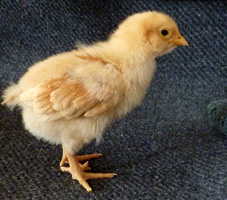Why do we want & need a new policy?
The current policy is misleading.
After the announcement in the Davis County Clipper about Bountiful allowing chickens and also after reading the current ordinance (Section 14-4-119), many citizens believe that back yard chickens are legal. City zoning officials say they are not. Many owners of chickens have now received notices from the city stating that they must get rid of their chickens to avoid paying a fine.
The current policy states "The animals listed in Table 14-4-119 below, ... are allowed in a residential zone." "Table 14-4-119 ... Fowl, pigeons, rabbits."
Many citizens want the benefits of back yard chickens
First, the local food movement itself has become very popular which hassparked a new interest for many in backyard food production.
Since chickens are one of the smaller protein producers, they fit well into a backyard food production model.
Second, rising energy and transportation costs have caused concern over increases in food costs, and backyard eggs offer a cheaper solution as they do not have to travel far to reach the plate.
Lastly, many citizens are becoming increasingly concerned about food safety, and with meat recalls and other animal industry issues in the news, backyard chickens offer many a safer solution. For these reasons, backyard chickens have become increasingly popular, safe source of protein to gaining a closer relationship to the food they consume.
Concerns About Allowing Chickens
The main concerns are: Noise, Odor & Dust
Each of these have a simple solution which we address in the
proposed ordinance.
Noise:
Do Not allow roosters. They are the noise producers.
Hens make a little noise, but never at night unless they are being
harassed by a preditor. Six hens are much quieter than the average dog.
Odor:
Proper coop management and clean-up take care of this problem.
Dust:
Most folks who have back yard chickens keep them on grass. We have
solutions for managing the dust issue in the ordinance.
Many Prominent Cities Now Allow Chickens
Los Argeles, CA; New York, NY; Portland, OR; Seattle, WA; Spokane, WA; San Antonio, TX; Austin, TX; Albuquerque, NM; San Jose, CA; Austin, TX; Madison, WI; Honolulu, HI; Ft. Worth, TX; Oakland, CA; Baltimore, MD; San Diego, CA; San Francisco, CA; Boise, ID; and many more.
From the Salt
Lake City
Ordinance
"The Birds and
the Bees in Salt Lake City"
"Salt Lake City has made changes to city ordinances to relax
restrictions and allow residential chicken coops and beekeeping.
Residents who qualify are now permitted to raise chickens for the
purpose of eggs and bees for the purpose of honey. Residential bees and
chickens benefit our community in a variety of ways while providing a
sustainable, healthy and fun source of food."
...
"Backyard chickens can improve the health of your yard and your family.
The most obvious benefit of keeping chickens is the production of eggs.
Eggs from well maintained backyard chickens are not only cheaper and
more environmentally friendly, but they are actually healthier and
taste better too! Compared to factory-farmed eggs, backyard eggs
contain significantly more Vitamins A and E, beta carotene and omega-3
fatty acids.
Chickens provide more than healthy food. They act as a natural pest
control by eating insects and their droppings are rich in
nitrogen, making it an excellent addition to your compost bin.
Finally, raising chickens and bees at home can help reconnect the
divide that has been created between the American diet and food
production. Playing a larger role in the production of the food on your
table will help foster a greater understanding of and appreciation for
what you eat. "


